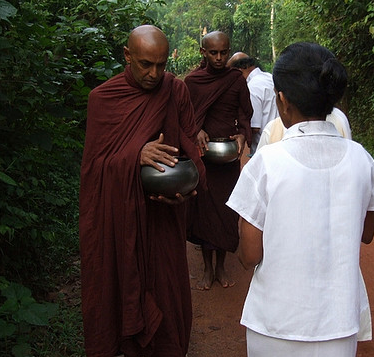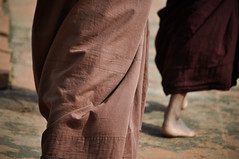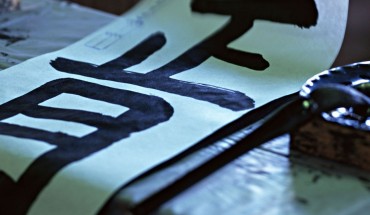[Part of our series: Arahant Stories.]
 Once, they say, the monk Elder called “Rag-robe” (Paṃsukūlikatthero), who lived in Pacinakhandaraji, decided to travel to the great pagoda-mountain* in order to worship the stupa there.
Once, they say, the monk Elder called “Rag-robe” (Paṃsukūlikatthero), who lived in Pacinakhandaraji, decided to travel to the great pagoda-mountain* in order to worship the stupa there.
After he had venerated the stupa, he thought to himself: “My robe is now quite old. In crowded places nearby I will be able to find a new one.”
So he went to the Great Abbey and revered the resident abbot. He asked him about the market place of the local village and came back the next day with his old robe.
When the abbot saw him, he asked: “Where are you going, brother?” – “I want to go into the village, Sir!” –
“Me too, brother”, said the abbot.
“Very well, Sir”, said monk Ragrobe and they both set off together.
But as soon as they passed the gate of the Bodhi tree enclosure the following thought occurred to monk Ragrobe: “At a gathering place of meritorious lay disciples I am sure to find a lovely new dress.”
Then monk Ragrobe reflected: “Unclean truly is my thought”. He stopped in his tracks and returned to his living quarters.
On the second day he tried again, but came only a little bit further: As soon as he passed the Mango tree courtyard a similar thought arose in him and he returned again.
On the third day he came to the upper gate of the Great Pagoda, only to turn on the spot, because he was overcome again by the same impure thought.
On the fourth day he was finally able to follow the elder monk on the entire route all the way to the village.
 “His thoughts must have been unclean”, thought the abbot. He took his robe and went with the monk Ragrobe to the village.
“His thoughts must have been unclean”, thought the abbot. He took his robe and went with the monk Ragrobe to the village.
That previous night someone who was suffering from indigestion, had sullied his own clothes with feces and then thrown them on a pile of manure.
When monk Ragrobe saw the blue-colored and completely soiled piece of clothing, he raised both hands and folded them in the respectful lotus gesture above his head.
The abbot was astonished and perplexed and asked monk Ragrobe: “What now, brother? Are you adoring a heap of dung, with folded hands?” –
“Not, venerable Sir, am I worshipping with folded hands a heap of dung. I adore my father, the sage of the ten powers**. So much harder indeed is it to get a rag from the cemetery, where you have to take a piece of cloth from an old corpse and clean it carefully from hundreds of little creatures.” –
The the abbot thought by himself: “Clean, indeed, are the thoughts of monk Ragrobe”.
And monk Ragrobe, standing in that very place, developed deep insight, acquired three of the fruits of Nirvana***. He took the garment, sew it into a robe, put on it, and went back to Pacinakhandaraji from where he had come and where he realized the highest fruit of holiness.
Translated by the author, Source: DN-Atth. III, p.1011 (PTS Edition)
==
 * Cetiyapabbata or Cittapabbata is modern Situalpawwe in Sri Lanka. That means you can go there too 🙂 See also here for more details or Ven. Dhammika’s most wonderful “A Buddhist Pilgrim’s guide to Sri Lanka”. Pācīnakkhaṇḍarāji: A district in Sri Lanka near Cittapabbata (Mhv.xxiii.4; see Mhv.Trs.155, n.3 and Cv. Trs.i.71, n.2) in which was the Vettavása vihára, given by Aggabodhi II. to the Kalinga minister who was ordained by Jotipála Thera (Cv.xlii.48). The name of the monk (Paṃsukūlikatthero) also happens to be a name of an ascetic practice (dhutanga) practiced by Buddhist monks since the time of the Buddha: “Pamsukulika” is a practice where the monk wears robes made of discarded clothes. See Vism. for more info.
* Cetiyapabbata or Cittapabbata is modern Situalpawwe in Sri Lanka. That means you can go there too 🙂 See also here for more details or Ven. Dhammika’s most wonderful “A Buddhist Pilgrim’s guide to Sri Lanka”. Pācīnakkhaṇḍarāji: A district in Sri Lanka near Cittapabbata (Mhv.xxiii.4; see Mhv.Trs.155, n.3 and Cv. Trs.i.71, n.2) in which was the Vettavása vihára, given by Aggabodhi II. to the Kalinga minister who was ordained by Jotipála Thera (Cv.xlii.48). The name of the monk (Paṃsukūlikatthero) also happens to be a name of an ascetic practice (dhutanga) practiced by Buddhist monks since the time of the Buddha: “Pamsukulika” is a practice where the monk wears robes made of discarded clothes. See Vism. for more info.
** An epithet for the Buddha. See here for more info on those ten powers of a Buddha.
*** He became an Anagami on the spot.
Nota bene: We had some earlier discussion on this subject: Purification in these ancient days, did not just include working on ones manners or improving one’s speech. In fact, we find many similar stories (some of which you can read in this series) which emphasize the role of memory (keeping ones meditation object present at all times) in the practice of these Buddhist monks. Whenever they lose their focus – and especially when an unwholesome thought would present itself – they would interrupt their outward activities and go back to an earlier (physical) moment to pickup their practice. This particular exercise was also known as “gatapaccāgatavattaṃ” – Time permitting, more on that next year :-). In case you did not notice: When the Ven. Ragrobe decided to interrupt his walk and turn back to his living quarters, he probably gave up on his alms round that day… Such was their practice!




1 comment